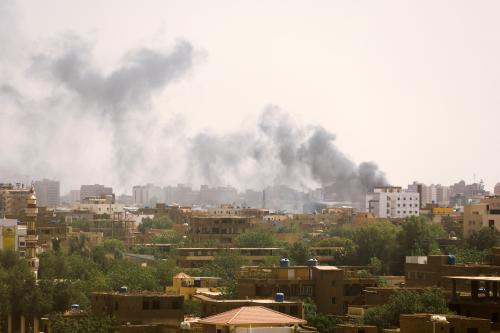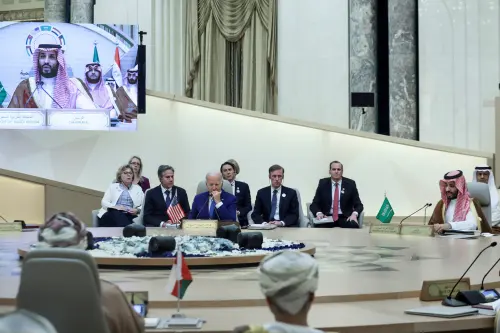Content from the Brookings Doha Center is now archived. In September 2021, after 14 years of impactful partnership, Brookings and the Brookings Doha Center announced that they were ending their affiliation. The Brookings Doha Center is now the Middle East Council on Global Affairs, a separate public policy institution based in Qatar.
The Arab Spring did not begin in 2011. It started a generation earlier, in 1985, at least according to many proud citizens of Sudan. A president was removed from office that year on the back of popular protests, an uprising that has served as a beacon of hope, however faint, during three decades of political darkness since. Today, tens of thousands of Sudanese have again taken to the streets of Khartoum, hoping to recapture those heady memories and send another president packing. Congress is uniquely positioned to help them, and to reduce the chances of another violent collapse in the region. But it must act fast.
This week’s record turnout is the latest in a series of anti-government demonstrations that began last December in response to rising food prices. After years of corruption and mismanagement, the country’s economy has all but flat-lined, kept alive only by sporadic cash injections from the Gulf. Recent years have seen similar protests over the country’s political and economic malaise, each crushed by the country’s formidable national security apparatus—one place the government has invested heavily as an insurance policy against its own misrule.
But this time around, something is different. Where past demonstrations were focused in Khartoum and championed by narrow constituencies, this year’s protests have proven more diverse and more widespread—and thus more resilient. Sparked in Atbara, a medium-sized city in the country’s north, the so-called #SudanUprising spread across the country and has been sustained by a broader swath of Sudanese society—including the professional classes that had long been decimated or chased abroad. Khartoum’s repressive regime is known for snuffing out such public dissent, but this time the revolutionary sentiment is burning bright.
Adding new fuel are divisions inside the ruling National Congress Party (NCP), a floundering organization that long ago traded policy and ideology for a platform of survival. The party, headed by President Omar Bashir, an indictee of the International Criminal Court, has often been misunderstood as a monolith. But fault lines have always run through it—between civilians and securocrats, Islamists and secularists, socialists and capitalists—including over how to engage the West. The cracks deepened last year when Bashir, who came to power in a 1989 coup d’état, again sought the nomination for elections in 2020. (Behind closed doors, more than a few party members will tell you they are as keen to see Bashir gone as his most ardent critics on the street.)
Splits within the country’s security establishment have also become more pronounced, the product of rivalry between the army and its increasingly powerful competitors. Protestors are calling on the army to step in, as it did in 1985, and so many officers suddenly confront a difficult decision: side with the embattled president or the masses now gathered at their gates. In recent days, army factions have taken measures to protect demonstrators against attacks from paramilitary forces and the omnipresent National Intelligence and Security Service. Today these forces clashed openly—an ominous sign of what may be to come.
The question at the core of Sudan’s current tumult is not whether President Bashir should go or not, as his departure is long overdue. The question is how: how to do so in a manner that maximizes the chances of a managed transition and minimizes the threat of violent collapse.
Opposition constituencies are rightly calling for a transitional government under new leadership, one that would oversee an inclusive constitutional review process and pave a path to internationally monitored elections. Such an arrangement would necessarily involve the release of political prisoners, an end to restrictions on political activity, and a cessation of conflict in Sudan’s peripheries. Most consequentially, a transition would necessarily include the NCP but articulate a time-bound exit for President Bashir, who has been clinging to office to avoid arraignment at the Hague. No one should pretend this will be easy, but it is the best path forward.
For far too long, American policy toward Sudan was defined by pressure and isolation, a posture that failed to produce desired outcomes in part because sanctions were too often employed to punish rather than to leverage change. (More recent U.S. diplomatic efforts to do the latter have yielded results.) Congress now has a chance to nudge Sudan in the right direction—by sending a clear signal to moderate forces of reform, and to those now sitting on the fence, that there is a path back to international credibility, and to American partnership.
Democrats and Republicans should adopt a resolution articulating the parameters of a transition, in exchange for which Congress would move quickly to roll back existing punitive measures and offer incentives to bolster a transition. This could include: supporting international debt relief at the World Bank and earmarking funds to clear the fairly modest U.S. portion of Sudan’s debt, thereby unlocking debt relief among a pool of larger foreign creditors; signaling readiness to restore diplomatic relations, including by encouraging a visit from Secretary of State Mike Pompeo and by confirming a new U.S. ambassador to Sudan—the first since 1997; allocating new development funding from the U.S. Agency for International Development (USAID) and taking concrete steps to promote commercial investment, and; lifting Sudan’s designation as State Sponsor of Terror, should Khartoum continue to comply with the technical requirements.
Those who hope for a better future are right now gathered at the gates of Sudan’s military headquarters. They deserve not only a chance for political renewal, but to be spared from a Libya-like disaster. Washington cannot determine the outcome, but it should act now to give them the best chance of success.




Commentary
Seizing Sudan’s moment of change: How Congress can help
April 10, 2019